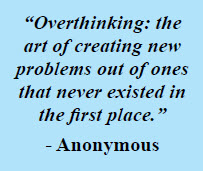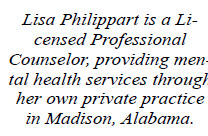 By: Lisa Philippart
By: Lisa Philippart
Overthinking can cause tremendous distress and suffering in our lives. In fact, overthinking is a magnifying glass for emotional suffering. In the next two articles, we will take a look at what overthinking actually is, what causes it, and then walk through some practical exercises you can use to stop overthinking so much.
Overthinking is the habit of applying analytical thinking and problem-solving in a situation where it is unhelpful or unproductive. Our ability to think critically and carefully about things (including ourselves) is one of our greatest abilities. But like any tool, it can be overused or used poorly. Here is a great analogy: Overthinking is like using a chainsaw to cut out pictures for a scrapbook. Even though it’s an incredibly powerful tool, there are times when it’s not useful and may even make things worse. The keys to ending the habit of overthinking include acknowledging that more thinking is not always the best tool for the job, becoming more aware of what situations only get worse when you overthink them, and learning alternative strategies that are more helpful.
 Let’s take a look at two everyday examples of overthinking. Worry is a form of overthinking where we imagine possible problems or dangers in the future. Of course, anticipating problems or threats in the future is a good thing to do. But helpful planning is different from unhelpful worry. Let’s say your spouse is on a flight and you start to worry about different ways the plane could crash and kill your spouse. This kind of thinking doesn’t actually keep your spouse safe, plus it adds a lot of stress and anxiety to you. Worry is the most common type of overthinking. Depressive rumination is a type of overthinking in which we replay events from the past in an unhelpful way. We spend time brooding or dwelling on our own past mistakes or failures. As opposed to helpful reflection, depressive rumination is unproductive and doesn’t lead to anything but shame, guilt, and sadness about yourself.
Let’s take a look at two everyday examples of overthinking. Worry is a form of overthinking where we imagine possible problems or dangers in the future. Of course, anticipating problems or threats in the future is a good thing to do. But helpful planning is different from unhelpful worry. Let’s say your spouse is on a flight and you start to worry about different ways the plane could crash and kill your spouse. This kind of thinking doesn’t actually keep your spouse safe, plus it adds a lot of stress and anxiety to you. Worry is the most common type of overthinking. Depressive rumination is a type of overthinking in which we replay events from the past in an unhelpful way. We spend time brooding or dwelling on our own past mistakes or failures. As opposed to helpful reflection, depressive rumination is unproductive and doesn’t lead to anything but shame, guilt, and sadness about yourself.
The most important thing to realize about what causes overthinking is that it comes from a good place. The ability to think critically and analytically is a wonderful tool when applied to problems that can be solved with thinking. So overthinking is just a misdirected application of a good thing! Another thought to keep in mind is that the initial cause of something can be very different than the maintaining cause. For example, a coworker’s sarcastic comment may have been the initial cause of anxiety, but your own reaction of worry may be the maintaining cause.
 What are the most common causes of overthinking? First, many people with a severe habit of overthinking developed the habit early in life. It was usually created because at the time, it was the only way to deal with a scary or difficult experience. Second, we don’t like to admit it, but many things in life are outside our control. Overthinking can alleviate that anxiety and feeling of helplessness since thinking often feels productive even if it isn’t. We feel a sense of false control and because the anxiety relief is rewarding, it makes the habit of overthinking stronger. Third, sometimes we persist in overthinking because it has a secondary benefit. For example, many people maintain their habit of overthinking because it leads to sympathy, pity, or even as an excuse for procrastination. And lastly, many people are so good at thinking in one area of their life (school or work), they assume that it will work in other areas (conflict with a spouse.) In other words, you are so good at thinking and are rewarded for it in certain aspects of your life, that you may have trouble putting that tool down in other parts of life. To the expert thinker, everything starts to look like a problem to be solved with lots of thinking.
What are the most common causes of overthinking? First, many people with a severe habit of overthinking developed the habit early in life. It was usually created because at the time, it was the only way to deal with a scary or difficult experience. Second, we don’t like to admit it, but many things in life are outside our control. Overthinking can alleviate that anxiety and feeling of helplessness since thinking often feels productive even if it isn’t. We feel a sense of false control and because the anxiety relief is rewarding, it makes the habit of overthinking stronger. Third, sometimes we persist in overthinking because it has a secondary benefit. For example, many people maintain their habit of overthinking because it leads to sympathy, pity, or even as an excuse for procrastination. And lastly, many people are so good at thinking in one area of their life (school or work), they assume that it will work in other areas (conflict with a spouse.) In other words, you are so good at thinking and are rewarded for it in certain aspects of your life, that you may have trouble putting that tool down in other parts of life. To the expert thinker, everything starts to look like a problem to be solved with lots of thinking.
Join me in my next article for ways to stop overthinking everything.
By: Lisa Philippart
Licensed Professional Counselor







